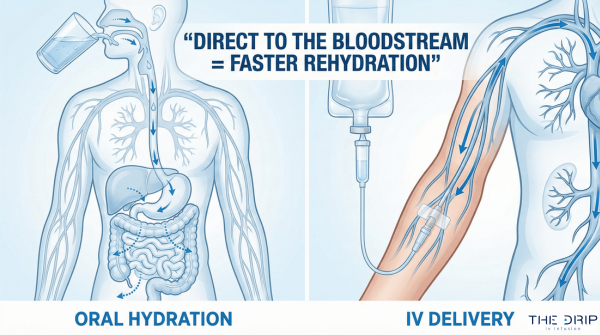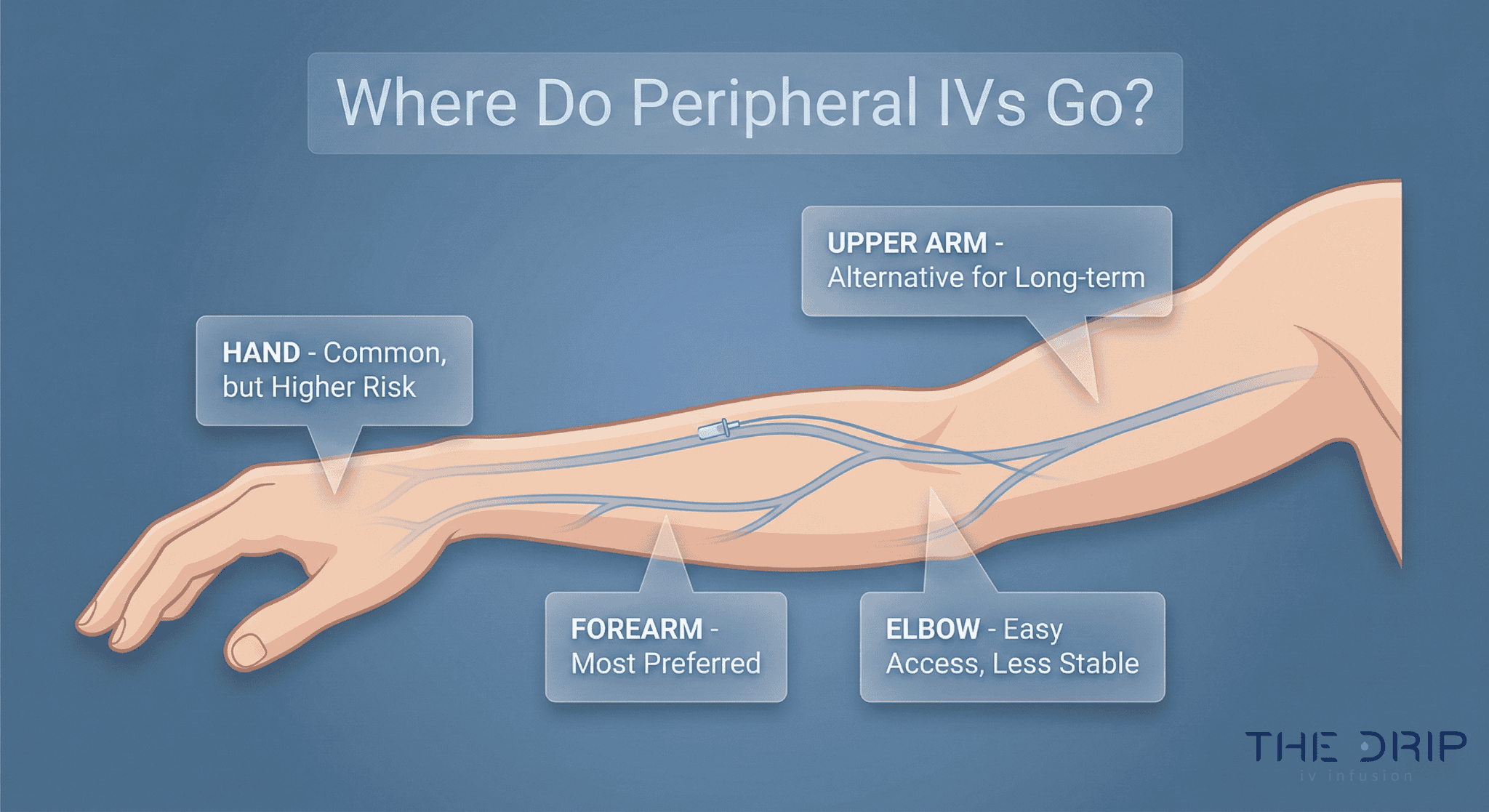Alongside minerals, vitamins are essential nutrients for the human body to function optimally. They potentially help your immune system function well, fight infections, heal wounds, and bolster your bones. One of the essential vitamins for the human body is vitamin C, which you take either orally or intravenously, like IV vitamin C therapy.
Nowadays, such therapy is the focal point of numerous medical studies due to its high remedial properties. So, let’s discover more about it!
What Is IV Vitamin C Therapy?
The water-soluble vitamin C, sometimes referred to as ascorbic acid or ascorbate, is vital to human physiology. Its capacity to operate as an antioxidant or cofactor for various enzymatic activities accounts for most of its physiological roles.
Humans are unable to synthesize ascorbic acid like the majority of animals. Instead, food or dietary supplements provide the body with the necessary vitamin C. People who don’t get enough vitamin C in their diets must take supplements to make up the difference.
In order to possibly help you with various conditions and make up for vitamin C deficiency, ascorbic acid supplements can be administered intravenously or as pills. However, IV ascorbic acid therapy may offer more advantages when compared to the two methods of obtaining vitamin C.
This is due to the fact that not all of the nutrients you take orally are absorbed completely. Vitamin C is administered intravenously to ensure that the complete amount is accessible. Vitamin C transforms from an antioxidant to an oxidative treatment, particularly when administered in large amounts.

Source: shutterstock.com/ Photo Contributor: Adisak Riwkratok
How is an intravenous vitamin C treatment performed?
The process of vitamin C infusion therapy is the same as any other IV treatment. A certain dose of vitamin C will be diluted in sterile water to a total of a certain volume of mL. The solution would be infused by an infusion pump.
Beforehand, a certified and trained professional would inject a needle into your vein, which leads the vitamin solution directly into the bloodstream. The needle will be attached to the container holding the vitamin C solution.
The dosage of vitamin C mixed with water varies from person to person. Important factors that play into deciding the dosage are the person’s age, weight, and height, as well as the reason why they’re taking the treatment.
IV Vitamin C Therapy Benefits and Side Effects
IV vitamin C therapy benefits
Vitamin C delivered through IV is mostly known to possibly boost the immune system. However, intravenous vitamin C might go beyond that.
Keep reading to learn about all the benefits of IV vitamin C administration that may bring you.
May prevent scurvy
A severe vitamin C shortage is the root cause of the illness scurvy. The key factor causing the condition is a lack of fruit and vegetable consumption. Sufficient vitamin C in your diet or supplements may treat this condition.
If scurvy is left untreated, severe symptoms could develop. For example, the following:
Anemia
Bleeding gums
Scaly skin
Swollen legs
Brittle hair
Bruised skin
Your teeth may fall out
Scurvy can be diagnosed in babies, children, and adults. However, adults are more prone to it because they engage in smoking and drinking alcohol, and breastfeeding.
Aside from these factors, chemotherapy, pregnancy, eating little fruits and vegetables, and eating disorders all contribute to scurvy.
Severe scurvy cases aren’t easily treated with just a few dietary and lifestyle changes. This would require the patient to receive higher doses of IV vitamin C to get the vitamin quickly and directly into the bloodstream.
Early signs of vitamin C deficiency
Poor appetite
Nausea
Fatigue
Headaches
Brain fog
Low concentration
Bruises
Muscle and joint pain

Source: shutterstock.com/ Photo Contributor: Stock-Asso
May help the immune system fight foreign bodies
Vitamin C potentially boosts the immune system and may help your immune system fight off intruders. Foreign bodies could be anything, such as viruses.
Reactive oxygen species (ROS), which lymphocytes or immune cells make, are excellent for protecting against outside invaders but may harm immune cells themselves. These vital cells are safeguarded by vitamin C since it is an antioxidant.
One reason the body might need more vitamin C is that immune cells may actually boost their amounts of the vitamin in order to defend themselves.
Additionally, vitamin C may aid in the production of white blood cells by your immune system and enhance immune cell performance.
May support treatments for specific types of cancer
Double Nobel Prize-winning scientist Linus Pauling and physician Ewan Cameron initially proposed the idea of using vitamin C as a therapeutic agent for cancer treatment approximately 50 years ago.
Numerous of their investigations have demonstrated that giving patients with terminal cancer high doses of intravenous vitamin C possibly resulted in longer lifetimes.
Clinical research conducted in recent years has demonstrated the vitamins’ abilities to possibly target malignant cells while sparing healthy ones.
Additionally, high-dose intravenous vitamin C may be effective as a cancer adjuvant therapy, working in concert with several common (chemo) therapies, as well as a way to lessen the harmful side effects of chemotherapy.
Furthermore, due to its safe and acceptable profile, high-dose vitamin C is increasingly gaining popularity in palliative care. High-dose vitamin C is widely recognized for possibly reducing pain in cancer patients.
This may be because cancer patients frequently have hypovitaminosis and vitamin C insufficiency, which are frequently made worse by antineoplastic therapy.
Despite the justification and copious proof, strong clinical data and phase III trials aren’t available. As a result, there is a need for greater public knowledge of the therapeutic use of this incredibly promising, non-toxic cancer therapy.

Source: shutterstock.com/ Photo Contributor: Andrey_Popov
The Story of Anton Kuraia
A few years back, 1News reported the story of Officer Anton Kuraia, who was diagnosed with leukemia. Anon went through a dozen of chemotherapy sessions but to no avail. Also, he was given four to eight weeks left to live.
However, Anton was introduced to a highly controversial cancer treatment: high-dose IV vitamin C therapy. Anton, his doctor, and his family were all hoping to at least prolong the time he had left to live. They didn’t hope for partial or complete remission whatsoever.
Aside from intravenous vitamin C therapy, Anotn started eating a vitamin C-rich diet. His wife reports to 1News that she immediately saw changes in her husband. She reported noticing his higher levels of energy, changes in appetite, and improved sleep.
Before starting vitamin C therapy, Anton’s doctors took a piece of his bone marrow. The sample showed that more than 90% of the cells were cancerous. However, after a few IV vitamin C treatments, another sample of Anton’s showed that the cancerous cells were replaced with regenerated healthy bone marrow.
Ultimately, Anton achieved complete remission.
May fight against the common cold
According to some animal studies, vitamin C might help treat or prevent illnesses brought on by bacteria, viruses, and protozoa.
The common cold is the human sickness that has been researched the most. Numerous trials with a combined total of over 11,000 people have demonstrated that vitamin C is ineffective in treating the common cold.
The immune system is thought to operate best when vitamin C is consumed regularly, according to a study. This is meant to potentially help avoid the common cold.

Source: shutterstock.com/ Photo Contributor: Andrey_Popov
May help reduce stress and anxiety
Catecholamines, sometimes referred to as stress hormones, are produced only when vitamin C isn’t present. Your adrenal glands, one of the organs with the greatest vitamin C concentrations, depend on this vitamin to function properly.
Your adrenal glands may enhance catecholamine synthesis while you’re under stress. Some people benefit from higher vitamin C consumption during periods of prolonged stress because they are utilizing more vitamin C as a result.
There have been some minor trials showing the advantages of vitamin C for anxiety. In small-scale research, it was shown that students using vitamin C supplements possibly had lower levels of anxiety than those in the placebo group. The study examined the effects of 500 mg of vitamin C daily supplementation on anxiety in students.
These results come only from taking a small amount of vitamin C orally. Imagine the tremendous benefits intravenous therapy would produce.
May reduce the risk of septic shock
Both sepsis and septic shock pose a serious risk to health. Clinical research has shown that treating sepsis patients with intravenous ascorbic acid might lower their risk of mortality and organ failure.
As a result, individuals who are hospitalized with sepsis might benefit from receiving IV vitamin C.
May get rid of allergic inflammation
Histamines are mediators of inflammation that are a typical component of the immune response. However, under some circumstances, they can overreact and result in an allergic reaction.
Seasonal allergies can cause an allergic reaction that vitamin C might help to moderate. It is not a remedy for really severe allergic responses, though.
May reduce PMS symptoms
Histamines might also contribute to PMS. Despite being a typical component of the menstrual cycle, histamine in the body can cause problems, including anxiety, headaches, and period pain.
Regular vitamin C intake may aid with PMS symptoms, which are brought on by inflammation brought on by histamines.
May make the skin look younger and smoother
Lack of vitamin C might frequently result in rough, dry, or irritated skin. Because of that, you can opt for vitamin C-based topicals and “feed” your skin with the needed nutrients.
Vitamin C may be a fantastic natural skin enhancer that could help minimize the appearance of dark spots and balance redness. Additionally, it may promote the formation of collagen, which should reduce wrinkles and fine lines.
Its antioxidant advantages are also thought to possibly aid in sun protection for the skin.
Other possible benefits of vitamin C
May help anemic people since vitamin C aids in faster iron absorption.
May help keep the thyroid healthy.
May lower the chances of heart disease.
May decrease the chances of Alzheimer’s disease and prevent cognitive ability deterioration.
High levels of vitamin C might prevent lead toxicity by significantly lowering the lead concentration in the blood.
High levels of vitamin C may help prevent vision loss and lower the risk of cataracts in adults.
High doses of intravenously given vitamin C may decrease stem cell transplant complications, including inflammation, infection, and death.
May help reduce hangover symptoms.
IV vitamin C therapy side effects
Vitamin C IV therapy may cause an infection at the injection site. This could lead to vein inflammation and bruising.
Might lead to hypervitaminosis if the dosage isn’t done properly.
Vitamin C treatments might cause kidney failure in people with a history of kidney disease.
Vitamin C therapy might trigger kidney stones to develop.
May cause blood clots.
People with an inherited disorder called G6PD deficiency should not be given high doses of vitamin C because it might cause hemolysis.
Vitamin C IV therapy is connected to fluid overload. Although, it may not be due to the vitamin C itself, but rather because it is intravenously taken.
People with hemochromatosis shouldn’t take IV vitamin C treatment because it may cause the body to produce excess iron.
How Much Does IV Vitamin C Therapy Cost?
Prices for IV vitamin C depend on many factors. Such factors include the provider of the therapy treatment, the brand of vitamins used, and the dosage.




